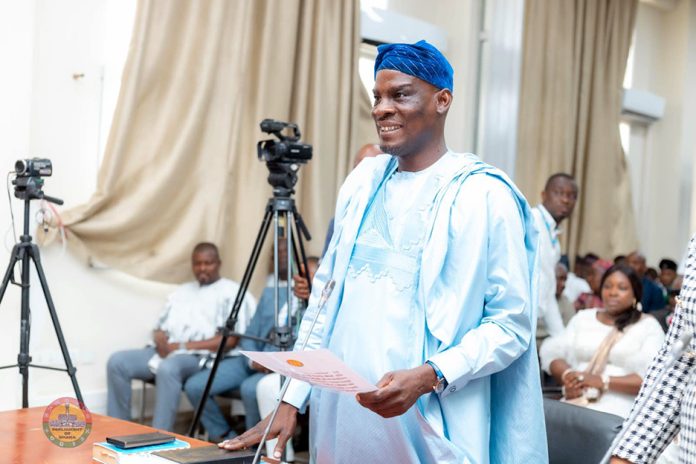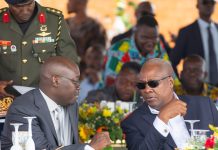Chairman, Bernard Ahiafor, MP, Akatsi South: Clerk of the committee proceed to administer the oath.
Haruna Iddrisu swears the oath: I, Honourable Haruna Iddrisu, swear by Allah that the evidence I shall give before this committee, touching the matter in issue, shall be the truth, the whole truth, and nothing but the truth. So, help me Allah.
Ranking Member, Alexander Afenyo-Markin, MP, Effutu: Chairman, thank you very much for the opportunity to make some few remarks. This is a very nostalgic moment for me. As you are all very much aware, Honourable Haruna Iddrisu is a respected colleague who has inspired me in so many ways.
On this occasion, and on this occasion only, the minority’s position is that Dr. Yaw Adutwum shall take up the questions and then ask some few questions on our behalf. These are largely policy questions, and thereafter I will have some few bites and then the nominee will most likely be discharged. We are reminding the majority that their well-behaved posture will lead to the fast-tracking of the nominee.
Chairman: Honourable Adutwum, you have the floor.
Yaw Osei Adutwum, MP, Bosomtwe: Thank you, Honourable Chair. I also have that kind of nostalgic feeling, coming to parliament and having our leader guiding, mentoring, and now leaving the education ministry and he’s about to take over. So, it’s a very interesting moment. Let me first of all congratulate you, Honourable Haruna, on your nomination for this very, very important ministry for our great nation, Ghana.
Honourable Chair, I know Honourable has done some work at the Ministry of Employment and Labour Relations. At that time, he superintendent over TVET education for most of the TVET schools that are now under the Ministry of Education. Chair, I would like the nominee to share with us beyond the manifesto commitments, what are some of the things that he’s going to look out for in terms of the role of education in this fourth industrial revolution.
21st century education is very important. I want him to share with us what his ideas are and what are some of the things that he’s going to be looking out for to ensure that we have a more robust education system. Thank you, Chair.
Haruna Iddrisu: Thank you very much. First Deputy Speaker and Chair of the committee, leadership of the committee, and Honourable Minority Leader, members of the appointment committee and colleagues who have had the opportunity to come and solidarize. It’s my honour and privilege to respond to the question posed by the just-passed Minister for Education on what President Mahama and the NDC intend to do with the education sector.
Let me assure the Honourable former Minister of Education that we will treat education not just as a matter of human rights, but a powerful and key driver of development and one of the strongest instruments that can be used to reduce poverty, improve health, and ensure gender inequality. President John Dramani Mahama intends to increase investment in the education sector to respond to the infrastructure deficits of the education sector, beginning from preschool through basic primary education to free secondary school and to the tertiary level.
Enormous financial investment will be made to continue with major initiative that was done. Chair, fortunately for me, this is a sector which has the best of expertise. I intend to rely on their varied experiences and expertise to guide me in the formulation of policy, the improvement of policy. But Mr. Speaker, let me assure this committee that President John Dramani Mahama has no option to cancel free senior high school.
Therefore, those who listen to him, even in the course of his campaign, to have stated that he will expand free senior high school to private schools was to tell Ghanaians that as President of the Republic, he wants to give true meaning to Article 25 of the 1992 constitution and Article 38 which spells out the objectives of our educational policy. But chair, the important thing is that he will subject the free senior high school to a review.
The review will mean subjecting it to, one, there will be a stakeholder national education forum to discuss the future and state of education in Ghana with emphasis on the future of the free senior high school, in particular, how to assure it of adequate, reliable, sustainable financing. Mr. Speaker, I do not want to at this moment start controversy, but some of the numbers, Mr. Minister, as you may recall, I will validate some of the statistics to some statistical validation of those issues.
So, we will undertake a stakeholder forum which will involve donors and partners, involve academia, parents, and students to review the free senior high school programme. I should acknowledge, I shall have noted, that it remains one of the biggest steps in wanting to transform education. It was a matter of debate between free universal education absorbing all the costs and progressively starting with infrastructure. But President Mahama intends to undertake a comprehensive review of it to make it sustainable. Thank you.
Chairman: You have a further question? Let me indicate that we have two members, leadership of the subject matter committee, but the two of them will not ask questions. One will pose all the questions. Go ahead with your question.
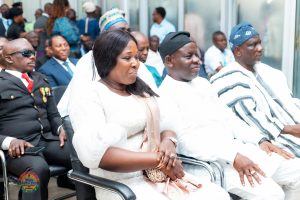
Yaw Adutwum: Honourable Chair, I’m grateful for the response from the nominee. Honourable Chair, beyond secondary education, which normally is the upper secondary because we, by our statutes, we don’t look at junior high as part of secondary. Beyond secondary education, I know there are a number of manifesto commitments in the field of tertiary, which is guaranteeing or is going to promise of a free level 100. If the nominee can shed some light on it so that we’ll be able to know what’s going to happen in that area.
Haruna Iddrisu: Thank you very much, Chair and members, and thank you, Honourable Minister. President Mahama and the NDC promised free tuition for students from level 100 who would undertake normal programmes in the various public universities of our country, including what he has said, expanded to private tertiary institutions. The number and population for which the country will require about GH¢345 million…
That is what the state will be required to do. We intend to provide that money to the affected universities, at least one to make refund to all those who have already paid those fees. But Chairman, the beauty of this is that it’s open. Even parents who are still willing to pay can do so under this principle that has been introduced by the NDC.
So, we intend to mobilise with the Minister of Finance some additional financing to cater for the population of students. It will be in the region of 125,000 as I look at it, and we’ll provide GH¢375 million to support that. So, every student who has paid will have a refund of his money, and the President intends to expand this over the years. Thank you.
Yaw Adutwum: Honourable Chair, one of the areas that I will always be proud of as a former Minister for Education is the area of science, technology, engineering, and mathematics education. Great progress has been made. Yes. It has been validated around the world. STEM education in Ghana. I want to ask the nominee what plan his soon to be ministry is going to do about STEM education.
Haruna Iddrisu: Thank you, Chair. Thank you, Members. Thank you, Honourable. The significant thing for the NDC and President Mahama, as far as education is concerned, is for us to contribute meaningfully to our national sustainable development efforts. At a tertiary level, emphasis will be on access, quality, and relevance.
At the secondary level, emphasis will be on foundational learning in order that we can produce critical thinkers for the future. There will be a review of pedagogy and curriculum at all levels of education to meet the country’s aspirations into the future and for meaningful contribution to our national development effort. I should note the effort you have done in getting STEM.
We intend to build, at least in every region of Ghana, a model STEM school which will carry from kindergarten to senior high school to produce men for the future of work. We appreciate that going into the future, we will need to train more people in science, information and communication, technology and engineering, in that respect, our investors will be expected to relate more to industry without compromising their core academic objective training models. Thank you, Chair.
Yaw Adutwum: Honourable Chair, this House has had an opportunity to approve GETFund Formular. We have all lamented about capping and debates about uncapping. I want to know the opinion of the nominee. In the next budget, coming up, what he intends to advocate for and push for in order to meet the aspirations of this House, which has been around for a long time. Thank you. Honourable Chair.
Haruna Iddrisu: Thank you very much, and thank you for the question. And for me, also nostalgic. Those days in 1997, I was one of the strong advocates with many of our colleagues around here to advocate for the establishment of the GETFund. Before then, tertiary education was largely public funded. Tuition remained free. There was no access even to private tertiary institutions.
The Get Education Trust Fund has done its part. In the last few years, it has suffered because of the decision of then Minister of Finance to cap it. President Mahama and the Minister of Finance have gone public, and I join them in saying that we will uncap the GETFund to free additional resources to support robust infrastructure development.
Indeed, mathematically, cap GETFund today is about GH¢3.2 billion, uncap it to make available to the Ministry of Education some GH¢7.9 billion, which will accelerate expanded infrastructure. For instance, there are about 2,800 schools that need to be fixed to deal with the problems of overcrowding.
There are about 26,000 schools which has no changing facility for young girls for purposes of hygiene. There are about 780 schools that is required to expand access to junior high school. We will uncap GETFund. I will engage the Minister for Finance to do this as a matter of expediency, and for the President to engage with the IMF to review the memorandum which included GETFund in the negotiations.
President Mahama has said that he will review the IMF. So, part of the review will be to uncap the GETFund and free those additional resources to support the country to rely on GETFund resources to finance education generally, in particular higher education.
Yaw Adutwum: Honourable Chair, in this great country, Ghana, the middle class has been squeezed for many years. Teachers, nurses have been squeezed, given the fact that the majority of them have to find money to send… in our public schools. And I’m happy that at least in greater Accra, you can see Accra STEM Academy.
So, the public-school transformation agenda is something that is very dear to the middle class. Honourable Chair, I want to ask my soon-to-be Minister for Education, what are his ideas and opinions about making sure that children, all children, have quality public schools to attend, and that if a parent doesn’t have the resources, they will not go and look for a loan to send their children to private schools. Thank you, Chair.
Haruna Iddrisu: Thank you very much, Chairman. Chairman, our intervention in the education sector will be all-encompassing. We will give true meaning to the pursuit of free, compulsory, universal, basic education. In my reading in the last few days, I have come to appreciate a major dichotomy which needs our urgent, critical attention.
Rural-urban dichotomy in the quality of education, northern-south dichotomy in the quality of education, and more deprived schools not producing because of quality of teachers and their presence of teachers in those areas. I intend, even when we assume office, to engage the Honourable Minister for Local Government as part of the financial realignment to get him to accept that teacher accommodation can be done by realigning Common Funds into building those for teachers in the rural areas.
I do know that conditions of service generally for workers in the Ghanaian public sector is not the best. I had the privilege in the last few years to be Ghana’s Minister for Employment. I did my utmost best to deal with some of the most incipient labour disputes of the country. But nonetheless, the cascading effect of what you do for the teacher, its economic and financial implications for the nurse, the pharmacist, the doctor, is what guides the purse.
Therefore, what is in the kitty, we need to improve revenue mobilisation generally. And in education, it will be appreciated if, and parliament members are here, if we can dedicate 20 percent of national expenditure into education or allocate at least a minimum of 5 to 6 percent of GDP to support education, then over a 10-year period, we would have done enough to expand and make these facilities available.
At the basic level, and this was my concern, you haven’t achieved free compulsory universal basic education, and you have up there a free senior high school education. You will still have in urban areas, Honourable Former Minister and Chairman, in the urban areas, the out-of-school dropouts, you see them. In the rural areas, you don’t. That’s the danger. We also have to be careful that we are not producing unemployed graduates from free senior high school who would become a threat, and unemployable.
So that is why, Minister, I hear some of the TVET initiative, because we have to improve employability. And employability is better done through technical vocational training. We will expand access to all TVET institutions. I’m aware that some of your initiatives were 30, 20, 40 percent, because you didn’t have money because you capped GETFund. You remember, I don’t want the minority leader to look into my eye.
So, the uncapping didn’t free resources for you to be able to expand those TVET institutions. President Mahama and the NDC will complete all those TVET institutions, given respect to the directive principles of state policy, that as president, he has the responsibility to the state to continue every good initiative of the previous government. I thank you.
Yaw Adutwum: The last one. Honourable Chair, I think there has been interesting debate about the issue of e-blocks. And e-blocks, we completed a number of them across the country. But the good news is that government is a continuum. And that is why, beyond completing e-blocks, we added boarding facilities to those that are in remote locations.
Adansi-Apagya is an example. Adugyaman is an example. Drobonso is an example. Where we added boarding facilities so that the facilities will become useful to the people of Ghana. It’s not about us. It’s about the children. So, I think beyond completing e-blocks that have not been completed, Honourable Nominee, Honourable Chair, would the Honourable Nominee look into the possibility of adding boarding facilities if an e-block is in a distant location and students cannot walk to the school, so they become more useful to the country?
Thank you. Haruna Iddrisu: Chair, the government will have no difficulty at all accepting to work to add boarding facilities where it’s necessary. My own personal experience during the campaign was a day I was driving from Yendi towards Mion. And you see a major e-facility on the Mion road. I saw schoolgirls and boys walking the street from Yendi, walking towards that area.
That reminded me that if there’s any opportunity to add a boarding facility to that, we should do that. And then also in Cheriponi and also in Wulensi, on the same road, I saw a facility where many of the catchment communities needed that. We would have no difficulty expanding boarding facilities where necessary. Ours is to expand access, ensure relevance and quality delivery by improving the conditions of service of teachers to the best that the economy can do and to improve their quality through motivation. Thank you.
Chairman: Thank you very much.
Afenyo-Markin: Chair, thank you. Honourable Ussif, go ahead.
Mustapha Ussif, MP, Yagaba-Kubori: Thank you so much, Honourable Chairman. And first of all, let me congratulate my senior brother, Honourable Iddrisu Haruna, for this nomination.
And also, just to put it on the record that we are very proud of you, especially with a young one, young politicians from the north. And you serve as inspiration to us from your days as the student leader all the way to your parliamentary responsibility from being a Minister of Communication, Minister of Employment, and now Education. My question to you, Honourable nominee.
One of the biggest challenges in our educational sector is the high drop rates at the basic level. And according to the African Education Watch, in the northern region, only five out of ten students who enrol in KG are able to complete primary school. And after that, only three are able to complete JSS.
Being the first Minister for Education from the northern sector of our country, in the Fourth Republic, what will you do to ensure that we address this issue that the Ghana Education Watch has just identified? Thank you.
Haruna Iddrisu: Thank you very much, Chairman and members and colleagues. Thanks for those warm compliments. It’s important, again, to recognise that as a country, there is the northern-south divide when it comes to access to education, beginning from 1876 when the first school was established. And subsequently, in the north, we got ours around 1951. So, you can imagine the gap and the deficit.
Even Achimota School, around 1924, at the time that Tamale Secondary School, which became the first in the north, we will work to close that gap. Indeed, even for the implementation of the free senior high school, it is noted that participation rate is very high in northern Ghana. That explains that probably it is true that poverty was a problem to assessing quality education.
So, it’s quality, equality, and equity. I also note that there’s about 5,000 infrastructure deficits when it comes to provision of junior high school, basic schools, and secondary schools in northern Ghana, and also in Oti and Western North. The statistics is not too encouraging for them.
The urban concept, many in this area have taken full advantage of it. With the rare privilege of the president trusting me as his Minister for Education, I will work towards equity and improve quality to education at all levels of our country. I would endeavour to close that gap, recognising that I may have to do some affirmative action interventions to get it going, to correct some of the historical imbalances that are responsible for the deficit. I thank you.
Chairman: Thank you very much. It’s now the turn of Honourable Rockson-Nelson Dafeamekpor.
Rockson-Nelson Dafeamekpor, MP, South Dayi: Chairman, thank you very much. Leader, you are welcome.
Haruna Iddrisu: Thank you, Honourable.
Dafeamekpor: You are moving to your fourth ministry, from communications to trade, to labour and employment, or employment and labour, and now education. I’m sure something bigger will follow this. You are welcome. Let me say that the dexterity with which you answer your questions, oscillating between different subject areas, even though they are all education, tells me that you will flourish in this portfolio, too.
You will do well. Let me also commend you that I’m part of the people you mentored. I remember very well the day you asked Agbodza to mentor me, because I have potential. And we are your products. You know your products. We are about seven. Suhuyini is here. So, I want to commend you for this.
I want to wish you well. And we know that the reform that the sector cries for, you will bring to bear, especially in areas that require it. The free SHS bill, that was never done. I’m sure it will be one of your priorities. So that it could be passed to ground this good policy. We wish you well. Approved. Thank you very much.
Haruna Iddrisu: Thank you so much for those warm words.
Chairman: Thank you very much. I will take a comment from the Chief Whip.
Frank Annoh-Dompreh, MP, Nsawam-Adoagyiri: Honourable Leader, may I have your attention? Let me join colleagues to commend you highly for your nomination. Not to depart, essentially, from what my good friend, honourable Dafeamekpor said. We’ve known you way back.
We all know, I personally know what you have done, in terms of your contribution to where I am today. I recall our days at the NUGs. I can only urge you and encourage you. I don’t have a question for you. Your competence cannot be lost on somebody like me. And those of us in the minority, especially. We know what you are. What you are and what you are capable of doing. I only want to caution that just be careful.
As you move forward. We are praying for you. Please be careful. Expectations out there are very high. And those of us in the minority, we love you. We love you. We want to see you succeed. We want to see the Honourable Haruna succeed. I am only cautioning. Honourable Leader. I’m only cautioning. Just tread with caution, and just be cautious. We are with you. And we wish you well. Honourable Chairman, thank you.
Haruna Iddrisu: Caution noted. Thank you.
Chairman: Thank you, thank you very much. I will now move to Deputy Majority Leader. Whether he has a question or a comment.
Emmanuel Armah Kofi Buah, MP, Ellembelle: Honourable Haruna Iddrisu. Congratulations. You did earn the right for the courtesies we have seen this morning because of your long years of dedicated service to our country. And there’s no doubt in my mind that you are going to be a very successful education minister. I have personally worked with you and received a lot of support as energy minister.
I’ve sat with you. And so, there’s no doubt in my mind that you are going to be very successful. But the sector you are entering has a lot of challenges. And one of them has to do with industrial unrest. Especially strikes by various professional groups in the educational sector. I know you’ve been a labour minister. And these are challenges that will stare you in your face as a minister. What are some of the strategies that you’ll be adopting to address some of these challenges?
Haruna Iddrisu: Chair, thank you very much. As I have said, it is a sector which is also advantageously has the best human resource of our country. From the professors, doctors. We work with them. Industrial disputes are inevitable. And for a developing country like ours, you naturally should anticipate some labour unrest, some conflict between labour and government, or matters which borders on their conditions of service.
For the universities, the statutes of the universities provide how council can negotiate… There were contentious issues about book and research allowance. But more importantly, it’s always a question of government timeously responding to agreements that have been made with trade unions and organised labour.
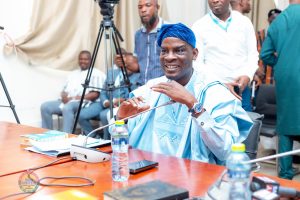
If you say that you want to revise allowances, it takes effect from 1st June. For many of them, they expect that by 1st July, that is ready at least to complement what they call their meagre or inadequate salary. So, the finance minister can, at many instances, I’ve had that experience with the Honourable Seth Terkper when he was minister for finance. And Chair, if you’ll permit me, I’ll just share this example.
There was an instance where judicial service workers took action at a time Theodora Georgina Wood was the Chief Justice of the Republic. And in a meeting that President Mahama requested Julius Debrah, Chief of Staff, together with myself and others to engage, I had to ask the Honourable Seth Terkper does he appreciate what it means when judicial service workers are on strike?
If somebody was entitled to a bill, and I’m sure another minority leader should be interested in this, if the courts don’t sit, you’ll be putting the person into a human rights crisis. At the time, Justice Theodora Wood related to me that look, in our IGF, there’s about 38 million. We cannot touch it because the Ministry of Finance have not granted us permission to use IGF.
It was when my attention was drawn even to a major constitutional deficiency, and I’m happy to bring it to your attention. At that time, judicial service workers, even up to now, unlike Parliament, you have your CI 118. This country has not treated the judicial organ of state with that. They don’t have that. I think Article 158(2) of the Constitution should deal with that particular matter.
They are entitled to it. It was then I got the advice then from the Chief Justice that look, let’s engage the Minister of Finance, let him allow you 30-40% to use the IGF so that sometimes when these fires erupt, you can deal with it at your own level. So, I want to believe that I do not anticipate.
I know that CETAG is unhappy. I know many teachers’ unions are waiting for President Mahama to assume office and they will say our standing allowances have not been paid. We will deal with it and we will spare what is available in the national kitty. We will do our best to keep the industrial peace of the country and keep the peace within the education sector and many other sectors of the economy for the good of our country. Thank you.
Armah Buah: Honourable Haruna, You are going to a ministry and the challenges are many. You are already aware of them and I think a lot has been talked about and these are not questions I expect you to answer. The challenges with the arrears school feeding programme, the challenges with gender.
Well, they will have to collaborate with the Minister of Education. Okay, well, let me let the nominee answer. The challenges with taking out schools under trees and so many others that I am very, very sure that you are competent to address. So, I wish you all the best and congratulations.
Haruna Iddrisu: Thank you.
Chairman: Thank you very much. We proceed to take a comment from Deputy Minority Leader.
Patricia Appiagyei, MP, Asokwa: Thank you very much, Chairman. It will be most unfortunate if I don’t add my voice to the many blessings that are going the way of my beloved son in whom I am well pleased. So, I just didn’t want to keep quiet but to bless him. I know your competencies and I know when people were questioning why education I knew what you could do. So, I bless you.
Haruna Iddrisu: Thank you, Chair. I hope I have the permission to call her Maa Pat. Thank you.
Chairman: Minority Leader and the Ranking Member of the Committee.
Afenyo-Markin: Chairman, thank you very much. Leader, this room is filled to its full capacity. It tells all of us how popular you are with the ordinary people. I can see behind you a lot of people. Now, I want us to do a little exercise on your CV. You have on page one, one of three, you have for residential address two…, Cantonment, Accra. If you’ll be pleased, the Cantonment is where you live, correct?
Haruna Iddrisu: Yes. When you are entering the house, you see the fidaus written by the wall. Afenyo-Markin: Very well, nominee, I understand. I know cantonment very well. You live at Cantonment.
Haruna Iddrisu: Yes, I do. I used to be in Bubuashie.
Afenyo-Markin: Honourable nominee, you provide the specific answers to the very questions I ask. You know, you being my respected senior, and members want us to finish you quickly. And if you open yourself up, then maybe there will be more follow-ups. So, you live at Cantonment.
Haruna Iddrisu: Yes.
Afenyo-Markin: Very well. Now, this residential facility, this property, is it a rented property or it is your house?
Haruna Iddrisu: It is my house.
Afenyo-Markin: You are very honest. Thank you very much. Thank you very much honourable Haruna Iddrisu. The reason why we, the young ones, respect you is such courage to face the truth that will take you higher. So, it is no offence for a politician to own a property at cantonment, correct?
Haruna Iddrisu: Not at all, depending upon your…
Afenyo-Markin: Honourable Haruna Idrisu. Ɛte sɛn? (How are you?)
Haruna Iddrisu: Ɛyɛ (I am fine).
Afenyo-Markin: Nkran he fa na wo te? (which part of Accra do you live?)
Haruna Iddrisu: Me te Cantoments bɛbi (I live in some part of Cantoments) respose creates laughter
Afenyo-Markin: Honourable Haruna Iddrisu, Mepawokyaw wo ayɛ MP nfie sɛn? (How many years have you been an MP?)
Haruna Iddrisu: Ɛbɛyɛ te sɛ 20 years ni (About 20 years now) the respose creates laughter again.
Afenyo-Markin: Very well, so those are, you’ve passed (laguter in auditorium). Because, Honourable nominee, you say on your CV that you speak English, Dagbani, Hausa and Twi. I am thus far impressed with your Twi. I’m sure that there is a southern inspiration.
Haruna Iddrisu: My wife, Mary Sarfoa Yeboah. Sometimes when I’m coming out, Ɔno na ɔbɛ kyerɛ kyerɛ me sɛ Twi no me nsua na me mbɔ mmɔden na me nka no yie (she’s the one who has been teaching me to learn the Twi to speak it properly) Committee members and guests burst into more laughter.
Afenyo-Markin: So, Chair, you have disclosed that Madam has inspired you with the Twi. That’s great. So, Chair, I want to know from the nominee whether or not he benefited from free education.
Haruna Iddrisu: I did, coming from northern Ghana at that time, I attended Kulikuli School through Baga Baga JSS took exams. I think that I didn’t do well in mathematics for that particular setting. And Tamasco at that time was insisting on a particular grade. And Navasco was open. If you had evidence that you were about rewriting, you could come and justify.
So, I went to Navarongo Secondary School for the A-level. And I’m proud to say that 1991, I probably was one of the best A-level students Navasco School produced. I still hold one of the best grades ever in business management from Navasco School. That record has not been broken. And so, yes, this was what motivated.
But travelling to Navarongo, Chair, was a difficult one. Seven hours from Tamale to Navarongo. And then you are carrying your gallery in a chalk box. You are not sure of the metro mass, metro mass. It was, we have survived and we have come a long way. Thank you, Chair.
Afenyo-Markin: So, Honourable Nominee, I can understand why you had to go through a law programme with those inspirations you’ve studied, philosophy, sociology, and all. And then from there you had to do law. Now, I note from page three of three on your CV, respectfully, your membership of the Ghana Bar, membership of Ghana Bar 2002 to date.
As you may be well aware, as a lawyer, your membership to the bar or with the bar, at the bar, originates from your being a member of a law firm or a department of an agency so recognised, you know, by the states. Now, let me explain, because my respected colleague is trying to draw my attention, though not on record. When you are called to the bar, you are a lawyer. You’ve been called to the bar.
After pupillage, yes, by your annual subscription, annual subscription, you cannot, unless something has changed, that I don’t know. But you are able to pay for your subscription if you can relate to a law firm or a department, a legal department of an institution. So, please, that is not indicated. Which law firm do you?
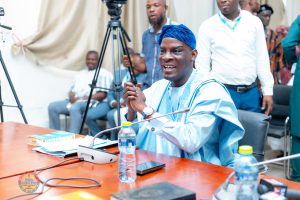
Haruna Iddrisu: Chairman, thank you very much. You know, at the time I finished University of Ghana, even though a student activist, I had a strong bond with Speaker Alban Bagbin, and therefore he recommended me for Law Trust. I’ve since been, one of our partners is here, James Mensah-Kule, who is my law school mate.
And the minority leader, the chairman of this committee, I graduated from law school with him the same day, Bernard Ahiafor, with Honourable Amoako-Atta and Professor Abotsi and Bentsi of Nana Addo Chambers and others. So, I am tied to law trust, and I’m a lawyer in good standing. I’ve paid all my subscription. Indeed, subject to Parliament clearing me, I do two additional things. I’m into football, and I’m into law. I appeared before the Parliament to get justification to hold those office.
Afenyo-Markin: Honourable nominee, enough. Honourable nominee, the almighty free SHS that you’re looking forward to reform, review, is in order. I mean, obviously, coming from where we started, from where people even taught, it is not possible. I am happy that as a nation, we appreciate the fact that we’ve done so well in the Parliament for its efforts. And above all, the Akufo-Addo government.
I feel assured that you intend to review and look at the areas that we were not too successful so that you make it better. That said, may I tease your mind on this? There is this talk that even in mighty America, free education does not include boarding. In advanced democracies where emphasis is on free education, boarding is not part.
And that Ghana, we have punched above our weight by introducing free boarding. Your honest view, do you think that we must continue to have free boarding?
Haruna Iddrisu: Even expand it. Kandiga is not America. Ulugu is not America. I’m sure one of the communities in the Winneba area is not America. They have access, their transport systems are networked and effective. It is not so for Ghana. For many children, I’m sure Members of Parliament even have to buy bicycles to support them to be able to commute to school daily. It means that for some to access this good quality education, they need to do more. So increased boarding facilities for deprived rural areas is important. Review, as announced by President Mahama, is not cancellation. Thank you.
Afenyo-Markin: Honourable Chair, if the nominee will be pleased, I should proceed to have a discussion with him on the tertiary education we have in Ghana. His party in opposition promised free university tuition for year one. And in all fairness to your government, you were very specific that you would pay for year one. First semester of the academic calendar for the universities has since commenced. May I know from you whether your government intends to implement this policy in your first budget to take care of semester one?
Haruna Iddrisu: On the authority of President Mahama, I’m sure his Minister of Finance, if this House approves the Honourable Ato Forson, will present the reset budget of the government. It will include some provision of some GH¢345 million to cater for admission fees for students undertaking courses in the normal subject areas, not professional areas like medicine.
And for President Mahama, this is a model experiment. You will look at it. How do we fare as a country? If it is possible for expansion, then he will expand it. And he has not asked that if you are able, you should not. We know that some students have already paid their admission fees. It will be refunded to the Honourable Leader.
Afenyo-Markin: Honourable Chair, we are engaging in a public discussion. If the nominee will be pleased, may he bring clarity to this matter. In your manifesto launch, which took place in Effutu, Winneba. By the way, Winneba is the capital of Effutu. And you entered Winneba with all the glory. And assurances to the nation. You did not say admission fee. The statement was three universities.
I’m quoting President Mahama’s words. Free first year tuition fees. First year, we have semester one and semester two. The NDC manifesto did not promise admission fee for first year. It did not promise admission. So I just, with the greatest respect, at the risk of sounding immodest, pray you to bring clarity to what exactly you intend doing for the first year university students.
Haruna Iddrisu: Thank you very much, Leader. Fortunately, I was a member of the manifesto committee. So, I still recall even when we had to discuss this subject, we asked Professor Oduro and the team to go out and work out the numbers for us to discuss with the President before we went public. Leader, for your purposes, tuition is free in all public universities in Ghana. Therefore, we were referring to admission fees. Thank you.
Afenyo-Markin: Honourable nominee, the jury is out there. So, some of the issues we are unable to resolve, we’ll leave it for the jury to determine. There’s no problem. We have to move on. Now, let me also, for the benefit of clarity, if you say all universities, does that also mean all tertiary institutions?
Haruna Iddrisu: Leader, if you note, that’s why, for instance, expanding free senior high school, the President said public, because the double track system has to be addressed. So, we have to look into private senior high school. What capacity do they have? Maybe 150,000, and you have a number of 300,000 young people who ought to be in school. Today, as we speak, year three and one are in school, two is home. Or year three and one are in school, two is home.
Afenyo-Markin: Honourable nominee, respectfully, I’m not cutting. I think the mainstay of my question was in respect of the tertiary. You know, we have nursing colleges. We have colleges for animal husbandry or veterinary. You know, we have…
Haruna Iddrisu: We use the word universities for that purpose. Thank you.
Afenyo-Markin: Yes, now, so do I take it from the clarity you provided that college of nursing, colleges of education, colleges of agriculture, and other colleges of tertiary in stature are not part of this first year free tuition policy of the NDC government?
Haruna Iddrisu: I’m not able to use tertiary and university interchangeably here for this purpose. I had admission fee for first year university students. Thank you.
Afenyo-Markin: Chair, again, on this very subject matter, I appreciate the sincerity of the nominee. And again, the jury is out there to make their determination on this important matter. However, honourable nominee, don’t you think that having regard to the expectation of the Ghanaian youth in respect of this free first year tuition, they would find the policy discriminatory if you are only giving this benefit to university students?
You have earlier referred to some constitutional provisions, Article 25 and 38 and all. Don’t you think that the Ghanaian youth out there who is attending a college of education, who is attending a college of agriculture, who is attending a college of nursing, will feel discriminated against since he or she is also having a tertiary education?
Haruna Iddrisu: For President Mahama, if it was possible to grant free education to every Ghanaian, he just would have done that. It depends upon the size of the economy and what our economy vis-à-vis demands from other sectors of the economy can do. Thank you.
Afenyo-Markin: On the TVET, TVET, you know the enrolment levels were very low until it was also made free. Can you share with us your plans in ensuring that you sustain, one, and two, to encourage as many talented Ghanaians to walk that path in acquiring skills rather than insisting on going into the mainstream senior high school?
Haruna Iddrisu: Thank you very much. The relationship between industry and employability hinges on the quality and training of young people with employable skills, which are largely technical and vocational. I’m aware that the Honourable Adutwum and his colleagues tried a number of TVET institutions.
In my review of the handing over notes, the infrastructure, he just started when government had to go through the debt crisis, and therefore there was no funding to complete many of them. Be assured that we’ll complete all of them to support President Mahama’s agenda to get more young people employable by way of those skills. Now the problem with many of the TVET institutions was retooling and equipment.
It’s not just about building the infrastructure. If you said carpenters, have you provided for their training? If you said masons, have you provided for their training? So, we’ll look into it and ensure that at least every region has a model of the TVET institution that is dedicated to them because we also must deal with a problem that you don’t get 300,000, 400,000 SSS students who don’t know their fate beyond completion of senior high school.
Then you’ll be producing a cohort of unemployment graduates for that category of young people. So, we’ll invest in TVET. Technical and vocational education is important and requisite financing will be provided for them and as I said, I look forward to decapping GetFund and dedicating many of it to get robust infrastructure done.
Afenyo-Markin: Chair, if the nominee will be pleased, I would want to draw his attention to His Excellency the President. On his campaign trail, I believe he identified some challenges in the school feeding programme. And at one point, he did indicate that instead of government having to procure for the schools, he will rather come up with a policy to let the headteachers themselves procure the items, the food items directly.
In other words, he will transfer the funds to the schools so that the schools themselves would procure the food items for the students. May I know from you, Honourable Nominee, if indeed, beyond the campaign rhetoric, this is also part of the policies that you are going to introduce as a way of ensuring, in your own way, efficiency in the free SHS system in terms of the aspect that deals with school feeding.
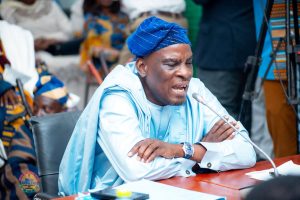
Haruna Iddrisu: First of all, to note that in our manifesto, the words that were used was to implement no academic fee policy for first-year students in all public tertiary institutions, including universities, colleges of education, and nursing training colleges, for the record, Leader. So, this is our pledge.
Afenyo-Markin: I know why I was pushing you. I appreciate it. I know why I was pushing you, because your manifesto is here. So, I wanted to be sure, and I’m happy you’ve gone back to clarify, to give assurance. I mean, school feeding in this context is referring to the senior high school, not the basic school feeding.
Haruna Iddrisu: Yes, school feeding for senior high school was largely done in a centralised form by the previous government, taking advantage of two institutions, the Buffer Stock Company and the Ghana Commodity Exchange. And it allowed for central purchase in some quantities of these food items. Headmasters already played some role when it came to perishable items, uniforms, and others.
We have to phase out implementation, because we cannot afford any food shortages as the schools run. Third January, we have to provide for stability of their calendar and make sure that there’s adequate food and the quality of their food. But certainly, the GES and Headmasters will have a role. It’s more, Chair, a cash flow problem and how early the Ministry of Finance releases those funds.
If we are not careful, there will come a time that you would have done purchases. And major suppliers will say that they won’t do it because they’ve not been guaranteed or assured. So, we have to deal with a cash flow problem, which is a matter which can be resolved between the Ministry of Finance and the Ministry of Education.
But for us, it’s to assure that we stop any potential disruption of the school calendar arising out of the lack of or delay in getting these food items to the school. We will work with those institutions, but define a role for the headmasters in a phase-out process. Thank you.

